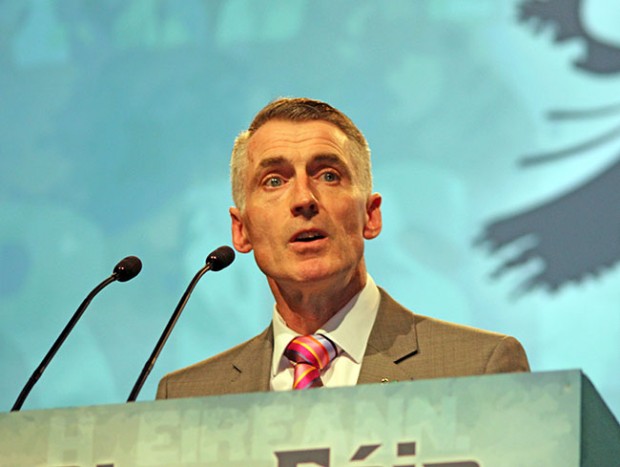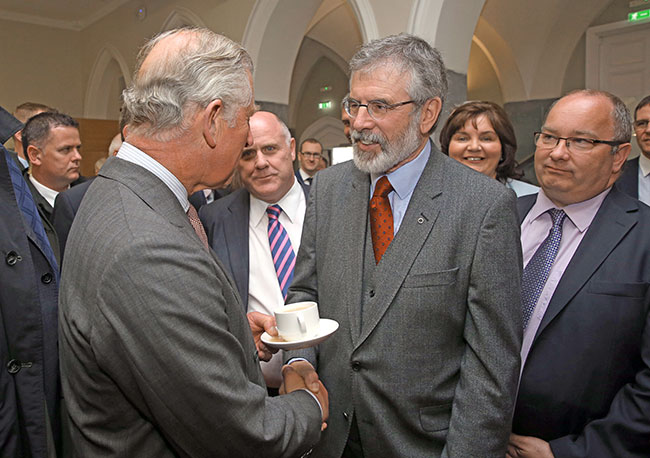1 November 2016 Edition
Reconciliation is an imperative – not an option
UNCOMFORTABLE CONVERSATIONS

• Declan Kearney addresses Sinn Féin's 2016 Ard Fheis
It is not acceptable to pass the legacy of the past on to a new generation to sort out
RECONCILIATION and healing in our society are an imperative for the Irish Peace Process. But their achievement continues to be both challenging and elusive. The required political and civic critical mass to bring them about still does not exist. We have to collectively work at building momentum to make them the new phase of the Peace Process.
So if not now, then when?
And if not by all of us, then by who?
Very recently I attended an event organised by the County Fermanagh Orange Order, in association with local Protestant churches, to discuss the 1916 Easter Rising. I believe it was an important event genuinely aimed at developing greater understanding about our different traditions and identities, and I commend the organisers for that.
I said from the floor that it is quite valid for us to agree to disagree but that a willingness to engage with each other on the basis of equality must be paramount. Engagement about our historical and current differences increases mutual understanding and that builds mutual respect.
Huge suffering has taken place in Ireland, North and South, and also in Britain.
The divisions in our society which exist are visceral. The pain from past actions experienced by our generation is real, not abstract or in another place.
I am sorry that hurt was caused to many families. That extends to the families of all combatants who acted on behalf of the British state.
All wars and political conflict create carnage and death. No war should be glorified or romanticised. That applies to our most recent conflict in Ireland.
But all sides caused pain and all sides suffered. Huge numbers of nationalist civilians, Sinn Féin members and IRA Volunteers were killed and the pain of their families is equal to the grief of any other family.
There were different sides to our conflict and there are multiple narratives.
They include republican, unionist and constitutional nationalist narratives, a British state narrative, and also the narrative of those who say none of this had anything to do with them.
There are issues about the past about which we will have to agree to disagree.
It is just as futile to ask political unionists to repudiate the B-Specials, the RUC and the British Army as it is futile asking a republican like me to repudiate the IRA.
I may disagree fundamentally with the British state and political unionist narratives but I also recognise that for those of that tradition these are valid and legitimate.
During her visit to Ireland in 2011, Queen Elizabeth spoke about how, with the benefit of hindsight, we can all see things which should have been done differently or not done at all. Prince Charles made similarly helpful comments in 2015.
There is an importance to that perspective in helping our society to move forward.
Republicans have publicly and privately acknowledged Queen Elizabeth’s sentiments and generosity.
But I have yet to hear unionist political leaders do the same.

• Prince Charles shakes hands with Gerry Adams
The British royal family seems to have a more developed and advanced view about the direction of our Peace Process than some unionist political leaders.
There are no right victims and no wrong victims; no innocent victims and no guilty victims.
There are only victims: republican, unionist, Irish, British, Green and Orange, Gael and Planter.
And the collective responsibility of all political and civic leaders must be to ensure that there are never again any more victims.
When we speak of the legacy of the past it is not abstract for many families. It is real and living.
So it is not acceptable to pass that legacy on to a new generation to sort out. The legacy of our past and absence of reconciliation has ensured that we remain a deeply divided society in the present.
The legacy of the past cannot be avoided if we are to move forward to a new phase of the Peace Process.
We all need to be prepared to deal with these issues by coming together, privately and publicly, to engage meaningfully and not to score points.
Reconciliation will not be built upon resentment and recrimination.
The mechanisms agreed under the Stormont House Fresh Start Agreement are an essential vehicle for moving forward.
It is unacceptable and wrong that the potential of this framework is being held back by the British Government’s veto on maximum information disclosure and refusal to release the funds which would allow legacy investigations and inquests to proceed.
There is no point in ending the war for it to be carried on politically and psychologically – by refusing to engage, to reach out, and to lead.
Sinn Féin is absolutely committed to ensuring a process of reconciliation and healing is established.
Republicans have stretched and challenged ourselves to develop the Peace Process.
And we have done so in pursuit of reconciliation and healing – sometimes at a cost.
It is now time that others began to do the same.
That should include active and unambiguous commitment from the leaderships of political unionism. There is a need for both a fresh start and a new start by political unionism towards reconciliation.
Reconciliation is not a one-way street.
At this year’s Ard Fheis, Sinn Féin adopted our policy document on reconciliation and healing, Towards an Agreed and Reconciled Future. It is a substantive public policy contribution to designing a roadmap towards making reconciliation the new phase of our Peace Process. We want reconciliation placed at the heart of government in the North and across Ireland. It means being prepared to reach out and to undertake meaningful initiatives which show real respect to each other; and, through combined, collective leadership, to demonstrate zero tolerance against bigotry and racism.
Sinn Féin is fully committed to that agenda. We cannot do this alone. It is crucial that others also begin to embrace this challenge and responsibility.
Declan Kearney is Sinn Féin National Chairperson
Editor’s Note: Guest writers in the Uncomfortable Conversations series use their own terminology and do not always reflect the house style of An Phoblacht.




